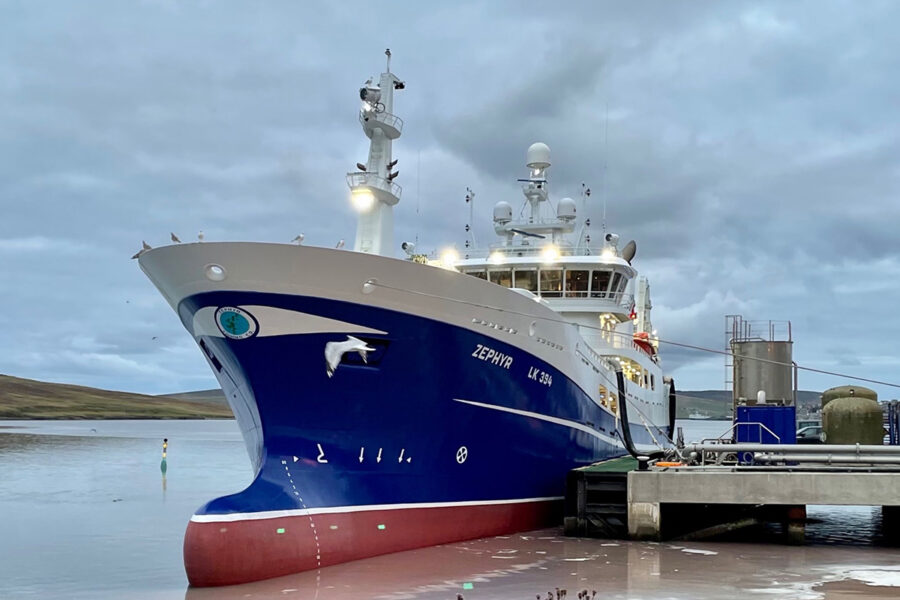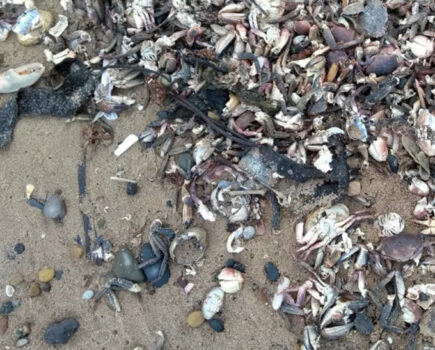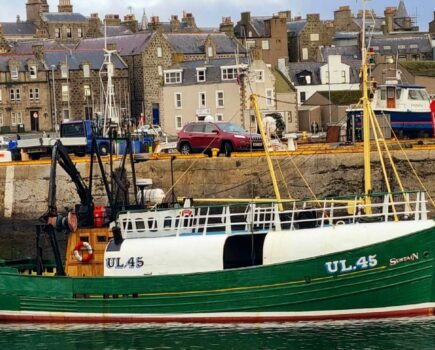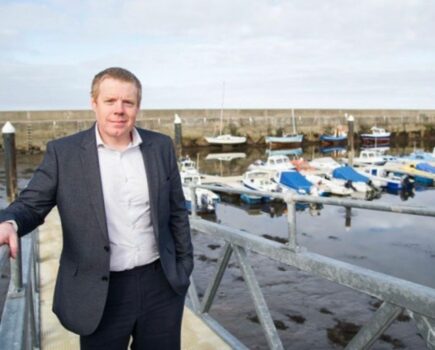Scotland’s Pelagic fishing industry is taking the government to court over the changes introduced to the economic link provisions attached to the vessel’s licence.
The action has been taken jointly by the Shetland Fish Producers’ Organisation (SFPO) and the Scottish Fishermen’s Organisation, who between them represent the vast majority of the UK pelagic fleet. The sector says it stands to lose millions of pounds in revenue should it be legally required to land 55% of mackerel and herring at Scottish ports.
Previous economic link conditions meant that a vessel could comply by either landing 50% of its quota into UK ports, or by employing crew of whom 50% lived in the UK, or by spending half of its operating cost in the UK.
However, last year, following two rounds of consultation, the Scottish government tightened these rules, did away with the crewing element, and required vessel owners to land at least 55% of shellfish and demersal species into UK ports as of 1 January, 2023.
The pelagic industry, which currently lands a large portion of its catch abroad, mainly in Norway, but at times also in Ireland and Denmark, negotiated a phase-in of the new rules, with 30% of landings required in the UK in 2023, 40% in 2024 and 55% by 2025.
Chief executive of the SFPO Brian Isbister told Shetland News that the pelagic sector was not opposed to the concept of landing more Scottish-owned and caught quota into Scottish ports.
However, he added that the sector felt it had to pursue the legal route out of ‘sheer frustration in terms of the lack of understanding and support from the Scottish government’.
“It’s purely and simply about the reality of the market we operate in and the impact that would have on our fishermen in the transition towards that,” he said.
“We offered to the government alternative approaches, which so far they have failed to take onboard.”
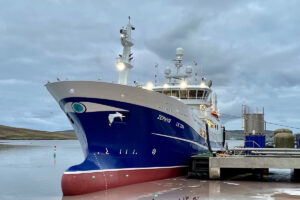
The Shetland-based Zephyr, riding high in the water after another successful discharge into the Pelagia Shetland factory in Lerwick. FN featured last year a plea by the factory owners for the relaxation of visa rules that would allow them to increase capacity and take a higher volume of landings that are currently destined for Norway or Denmark. (Photo: Sydney Sinclair)
A legal bid to halt the introduction of the new rules pending the outcome of a judicial review failed at the end of last year, shortly before the new licence conditions were issued.
In a judgement made on 23 December, Lord Ericht at the Court of Session refused to grant an interim interdict after the Scottish government gave assurances that the industry would be able to claim damages should the change in the rules be found unlawful by the court at a later date.
In his legal opinion, Lord Ericht noted that it was one of the SNP’s 2016 election pledges to set new landing targets ‘for all Scottish fishing boats to ensure more fish are landed in Scotland to create jobs and support local businesses and our fishing communities’.
The judge further noted that landing requirements in England had been increased from 50% to 70% from 1 April, 2022.
The application and judgement only came to light recently, possibly reflecting a reluctance on the part of the pelagic sector for any public airing of their finances, particularly at a time when other sectors of the industry continue to struggle with profitability.
The application lodged with the court claimed that the applicants would suffer substantial financial loss, as pelagic fish landed and processed in Norway are a premium product and attract higher prices. For some vessels, the entire catch may be landed in Norway for the benefit of a higher price than could be obtained in Scotland, the industry said.
Giving an example, it said that the 55% landing requirement would amount to an annual reduction in revenue of £1.5m for one particular vessel, and that average losses incurred by the 20 boats represented in the application would be £674,000.
The price gap is said to be £200 per tonne for mackerel and £70 for herring – a claim disputed by the Scottish government, whose legal team made the counter-claim that the average mackerel price in Scotland and Norway is substantially the same, although prices vary across the season.
The court noted that at 40%, the operating profits claimed in the application were at the high end of the range, while the government submitted that Norway was benefiting from Scottish fishing quota, and that Scottish fish processors had spare capacity.
It also observed that, given the ‘super-normal profits’, the new landing condition would be a small proportion of the annual revenue of the pelagic vessels, but would provide a significant increase to the Scottish economy.
It is expected that the judicial review will be heard at the court at the session in the autumn of this year.
Economic link background. Link conditions: evolving since 1997
The economic link was originally introduced by the new Tony Blair government in what was one of its first actions on coming to power in 1997. The newly elected prime minister flew to Brussels, returning with an exchange of letters agreeing that the UK could impose conditions on vessels forcing them to compensate local communities for quota they had, in effect, ‘taken away from them’,
The link was put in place following years of anger about the so-called ‘quota-hoppers’ – Dutch and Spanish vessels that had reflagged into the UK to take advantage of UK quota. Prior to 1997, UK attempts to limit quota- hopping saw the government lose the infamous ‘Factortame case’ when Spanish owners took it to court, and won.
Much of the initial economic link was paid for by these vessels in the form of a transfer of quota back to UK administrations, which reallocated it mainly to inshore vessels.
Changing quota demand and availability saw the link conditions evolve towards a growing obligation to employ UK resident crew, or to land a proportion of quota species into UK ports. Devolution saw Scottish authorities introduce different requirements from those elsewhere in the UK.
The landings requirement for the Scottish pelagic fleet currently being challenged by the sector is one more chapter of this story.
This story was taken from the latest issue of Fishing News. For more up-to-date and in-depth reports on the UK and Irish commercial fishing sector, subscribe to Fishing News here or buy the latest single issue for just £3.30 here.
Sign up to Fishing News’ FREE e-newsletter here.

